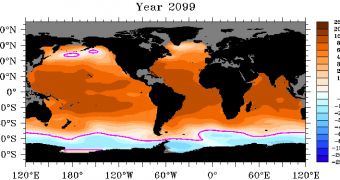During the 1980s, the theory of ocean acidification as a result of the greenhouse effect arose and has been attempted a demonstration ever since. The recent atmospheric carbon dioxide level measurements proved it, as well as its impact on oceans. Besides the negative results of the acidification of the planet's waters on marine ecosystems, it also leads to the increase of ocean-generated noise, as new studies claim.
Usually, the gases in the atmosphere are in balance with the oceans, as the amount of atmospheric carbon dioxide is in direct proportion to that which is dissolved in the ocean, according to “Henry's law”. Approximately a million tons of CO2 per hour is currently absorbed by the waters, which is ten times more than before industry came into equation, preventing more disastrous effects of the global warming. And it is predicted that the oceans will have to cope with even larger quantities of carbon dioxide in the future, if the newly-developed CO2-clearing technologies fail to help. All this results in the oceans' becoming more and more acid.
Aside from the obvious dangers posed to the marine life, this also threatens to cause a rise of the overall volume of the ocean, which further increases the number of generated problems. Basically, the increased pH of the water allows sound to travel farther, which affects mammal communication and human scientific, military and commercial activities. It is known that some specific clumps of charged molecules absorb the ocean-generated sound wave within human hearing range. The lowering of the pH (acidification) changes their structure, making them lose their absorbing properties.
The 0.3 units lower pH predicted by the Intergovernmental Panel on Climate Change for the 2050s caused by constant CO2 emissions would determine, based on the calculations of Peter Brewer and colleagues from the Monterey Bay Aquarium Research Institute in Moss Landing, California, a sound traveling distance up to 70 percent bigger. Further measurements indicated that the sound absorption decreased by 10 to 15% in the Atlantic and Pacific oceans, and probably more, since the estimates don't take into account other sources of acidification.
This process will affect sealife in time, especially the organisms protected by tough shells, which will dissolve upon constant exposure to an increasingly more acid pH. Richard Zeebe from the University of Hawaii in Honolulu also estimates how this will disturb other marine lifeforms, “Because of this noisier ambient level, marine mammals may have trouble communicating. At the same time, their sound may travel further in the ocean. We have to do a lot more work”.

 14 DAY TRIAL //
14 DAY TRIAL //